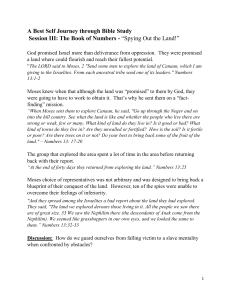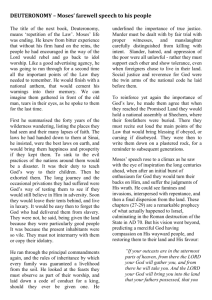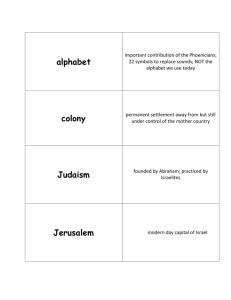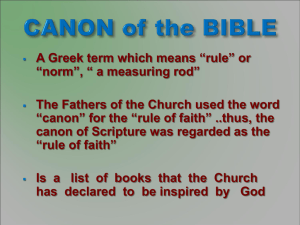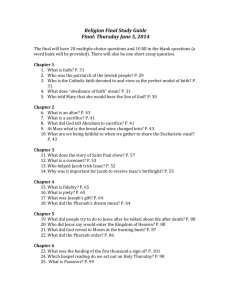Story Notes Chapter 6 - Zion Lutheran Church and School
advertisement
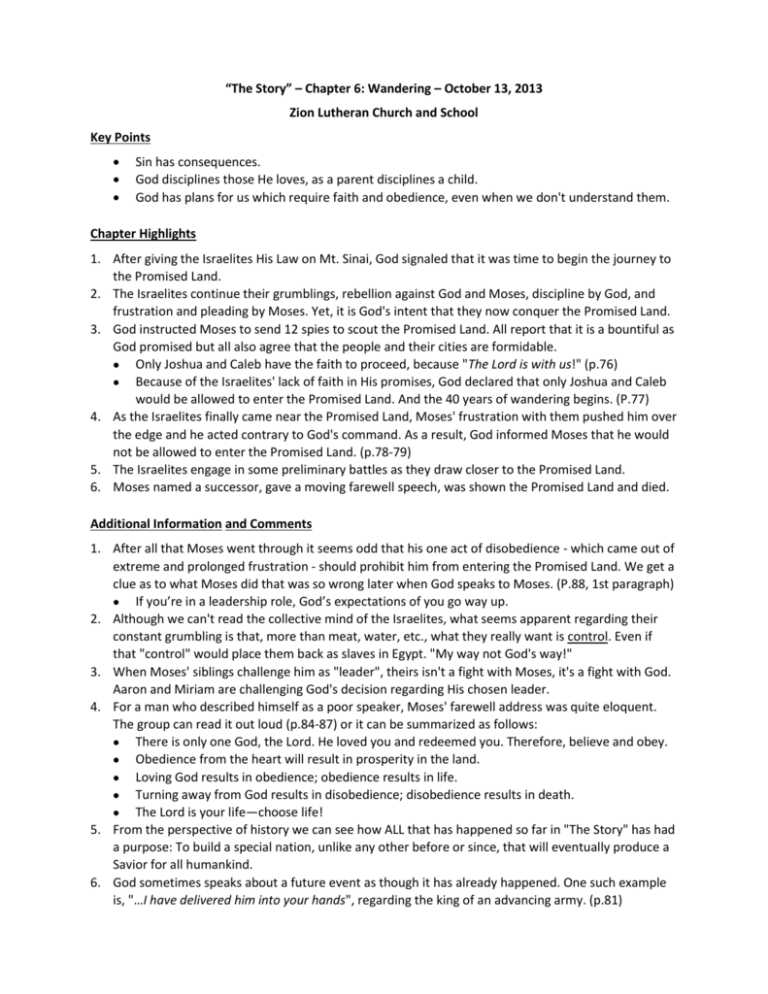
“The Story” – Chapter 6: Wandering – October 13, 2013 Zion Lutheran Church and School Key Points Sin has consequences. God disciplines those He loves, as a parent disciplines a child. God has plans for us which require faith and obedience, even when we don't understand them. Chapter Highlights 1. After giving the Israelites His Law on Mt. Sinai, God signaled that it was time to begin the journey to the Promised Land. 2. The Israelites continue their grumblings, rebellion against God and Moses, discipline by God, and frustration and pleading by Moses. Yet, it is God's intent that they now conquer the Promised Land. 3. God instructed Moses to send 12 spies to scout the Promised Land. All report that it is a bountiful as God promised but all also agree that the people and their cities are formidable. Only Joshua and Caleb have the faith to proceed, because "The Lord is with us!" (p.76) Because of the Israelites' lack of faith in His promises, God declared that only Joshua and Caleb would be allowed to enter the Promised Land. And the 40 years of wandering begins. (P.77) 4. As the Israelites finally came near the Promised Land, Moses' frustration with them pushed him over the edge and he acted contrary to God's command. As a result, God informed Moses that he would not be allowed to enter the Promised Land. (p.78-79) 5. The Israelites engage in some preliminary battles as they draw closer to the Promised Land. 6. Moses named a successor, gave a moving farewell speech, was shown the Promised Land and died. Additional Information and Comments 1. After all that Moses went through it seems odd that his one act of disobedience - which came out of extreme and prolonged frustration - should prohibit him from entering the Promised Land. We get a clue as to what Moses did that was so wrong later when God speaks to Moses. (P.88, 1st paragraph) If you’re in a leadership role, God’s expectations of you go way up. 2. Although we can't read the collective mind of the Israelites, what seems apparent regarding their constant grumbling is that, more than meat, water, etc., what they really want is control. Even if that "control" would place them back as slaves in Egypt. "My way not God's way!" 3. When Moses' siblings challenge him as "leader", theirs isn't a fight with Moses, it's a fight with God. Aaron and Miriam are challenging God's decision regarding His chosen leader. 4. For a man who described himself as a poor speaker, Moses' farewell address was quite eloquent. The group can read it out loud (p.84-87) or it can be summarized as follows: There is only one God, the Lord. He loved you and redeemed you. Therefore, believe and obey. Obedience from the heart will result in prosperity in the land. Loving God results in obedience; obedience results in life. Turning away from God results in disobedience; disobedience results in death. The Lord is your life—choose life! 5. From the perspective of history we can see how ALL that has happened so far in "The Story" has had a purpose: To build a special nation, unlike any other before or since, that will eventually produce a Savior for all humankind. 6. God sometimes speaks about a future event as though it has already happened. One such example is, "…I have delivered him into your hands", regarding the king of an advancing army. (p.81) 7. As they neared the Promised Land, the Israelites didn't "only" turn away from God, they turned to Moabite "gods". (p.82) Discussion 1. When have you felt overburdened like Moses did? When have your burdens caused you to question God’s goodness? How might Moses’ interactions with God help you handle burdens in the future? 2. Israel believed the report of the faithless spies out of fear. What do you think was the cause of their consistent lack of faith and trust? 3. God asks the question: “How long will these people treat me with contempt?” (p. 76). Do you think their actions merit such a severe word as “contempt?” 4. Israel’s rebellion led to a 40 year punishment and kept an entire generation from seeing the Promised Land. Can you think of any life choices that could result in irrevocable consequences? (One example: Abortion) If so, how might you minister to someone in such a situation? 5. Moses is described as a “very humble man, more humble than anyone else on the face of the earth” (p. 73). What examples from his life illustrate this? How would you rate your humility level? (Yes, this is a trick question.) 6. Moses charged Israel with passing the commandments down to their children. What is your role in teaching the next generation? What are some practical ways you can serve as a parent, grandparent, or mentor? The authors of supplemental "Story" material use the terms "Upper Story" and "Lower Story" as follows: "Upper Story" is the term for things which are purely in God's realm. It's His plans. "Lower Story" is the term for things which (1) are earthly, but (2) carry out God's plans. With that in mind: 7. Carefully reread Moses’ farewell message (p. 84-88). How does he emphasize God’s Upper Story of redemption? 8. The manna and quail episode ended in a severe plague (p. 71-73). What Upper Story lessons was God trying to teach? How do they apply to us today? Summary 1. God’s plan was: deliver His people through a series of miracles, defeat their enemies, give them a covenant and set of laws to make them a chosen nation, and provide them a land of promise. Or, to put it more succinctly: God speaks, the people listen. God delivers, the people believe. God provides, the people trust. God always held up His end of the bargain: He always provided, always delivered, always kept His promises. 2. The Israelite’s reaction (as a whole; there were some who were faithful): They always forgot, always questioned, always rebelled. 3. The question for us today is to ask which way are we going? God's way or the way of the wandering Israelites? For Next Week 1. Consider how God has used discipline in your life…then thank Him. 2. Pray for a spiritually mature heart that does not complain and grumble when things don't go "your way". 3. Consider ways that your life has gotten off course from what you know to be God's intentions. What do you think led to this? What did you do - or do you need to do - to get back in line with God's plans for you? 4. Consider whether you have any sins which are likely trying God's patience…then take them to God.
